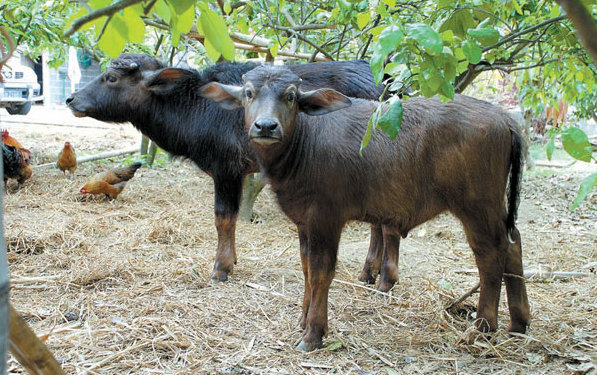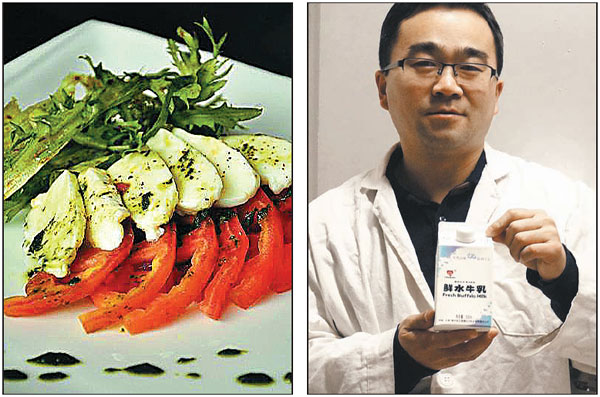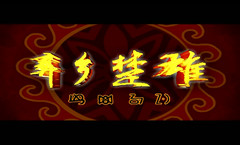Thank you, Mr Buffalo
By Deng Zhangyu ( China Daily )
Updated: 2013-12-13
A lot of love goes into the buffalo milk and mozzarella that is produced out of Tengchong in Yunnan, the physical fruits of an eco-friendly lifestyle prevalent in the region. Deng Zhangyu finds out more.
In a country where dairy products are still not part of the daily diet of the masses, Ouyang Yuancheng is selling water-buffalo mozzarella, a niche product even in some relatively Westernized countries.
His cheese is made from Chinese buffalo milk produced in the southwest province of Yunnan. Ouyang clearly understands it's a tough road to persuade Chinese consumers to accept such a rare delicacy, but he persists in the belief that his consumers deserve the best and safest products.
|
Ouyang Yuancheng's Aiai Dairy Farm gets milk from about 10,000 buffaloes from Tengchong, a picturesque town surrounded by forests and mountains in Yunnan. Photos provided to China Daily |
Just looking at the bespectacled young man, it is hard to think of him as a hardcore salesman.
All you have to do to get him going, however, is to mention "milk" and "mozzarella" and all the artisan terms slip out of him so easily you would think he is a seasoned expert - which he is.
The 33-year-old spent six years studying food safety and curd fermentation in China and at Wageningen University in the Netherlands. He was a laboratory man, and that is why he keeps on experimenting with mozzarella recipes for Chinese consumers.
"Few Chinese accept the taste of cheese easily. So I have to teach them how to eat buffalo cheese in ways they are familiar with," says Ouyang.
Though many of his recommended recipes are traditional ones-the classic salad with sliced mozzarella on top of tomatoes, and pizza topping - he recently posted pictures on his micro blog showing how to cook mozzarella in hotpot, a creative experiment.
In his mozzarella factory in Tengchong, he has a restaurant offering eight Chinese style dishes using buffalo mozzarella.
The cheese in Chinese supermarkets, says Ouyang, is mostly the processed cheese catering to consumers who know no better. He says more than 80 percent of the ingredients in processed cheese are additives, such as sugar and starch.
"It means there is 80 percent uncertainty in terms of food safety," he says. He insists on producing cheese made from pure buffalo milk.
It is easy to tell a good mozzarella from inferior cheese, Ouyang says, by testing how elastic it is. If there are additives, he says, the strands will break easily when the mozzarella is stretched.
Buffalo milk contains high levels of protein and there is no need to add chemicals to improve the levels of protein, the main reason why melamine was found added to milk in China in 2008, a scandal which almost destroyed the dairy industry.
Ouyang says he has gotten high praise from some consumers. That actually makes him nervous, because he feels it shows that Chinese consumers are still very disappointed in the dairy industry in general.
"That's just what natural mozzarella should taste like," he says. "You can't have the taste of meat from mozzarella."
His buffalo milk comes from Tengchong, a picturesque town surrounded by forests and mountains, where Ouyang says his Aiai Dairy Farm gets milk from about 10,000 buffaloes after signing up local farmers.
The dairy issues certificates to farmers who produce milk that meets their requirements. To keep milk safe, the dairy asks farmers to mark milk contaminated by antibiotics used on sick buffaloes. Ouyang still pays the same price for contaminated milk, even though it is not used, so farmers are willing to tell the truth.
Currently, Ouyang's factory uses buffalo milk provided by a village on the hillside of Gaoligong Mountain. The villagers here still live very simply; they don't need to close their doors while sleeping at night. With about five months of rain each year, the area boasts more than 70 percent forested land.
"We've tried buffalo milk from other places, but only milk produced in this village is perfect," says Ouyang. He spends most of his time in Beijing, pushing and promoting sales, but he always grabs the chance to visit the village every year.
Ouyang says he has visited cheese factories in Europe and they all have the advantages of fresh air, good water and healthy earth that guarantee the quality of cheese. All are well managed even though they may be small compared to factories in China.
Tengchong's environment gives him the confidence to compete with imported mozzarella.
Ouyang knows the cheese market in China is still very small and will need a lot more work. He himself was only exposed to cheese when he went to the Netherlands for his master's degree.
Apart from buffalo mozzarella, Ouyang also sells buffalo milk in Beijing, and that seems even more popular.
What sets this young idealist apart is his commitment to food safety. He often goes the extra mile to remind his clients of when to finish up the milk and the mozzarella, and how to store them properly.
He is always careful to make sure his products are properly handled at the right temperatures in transit and storage, and that his consumers get them delivered freshly harvested from the Tengchong water buffaloes.
"Many of my Chinese consumers are young parents," he says. "They buy mozzarella for their children for the sake of nutrition. The cheese market is still pretty primitive here."
Contact the writer at dengzhangyu@chinadaily.com.cn.
|
Left: Ouyang Yuancheng's mozzarella recipes include the traditional ones such as the classic salad with sliced mozzarella on top of tomatoes. Right: Ouyang Yuancheng runs his factory in Tengchong, selling water buffalo mozzarella and buffalo milk. |



